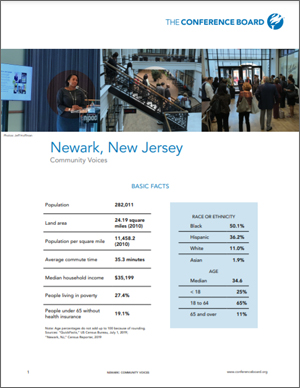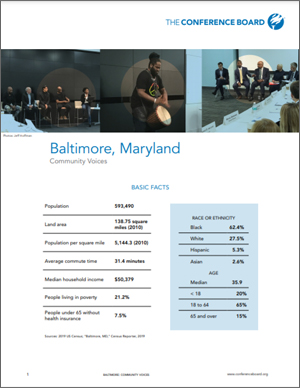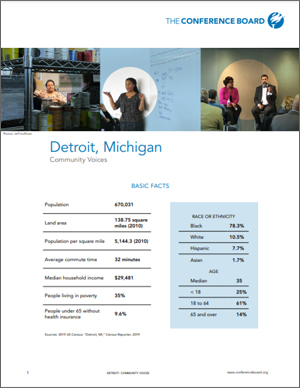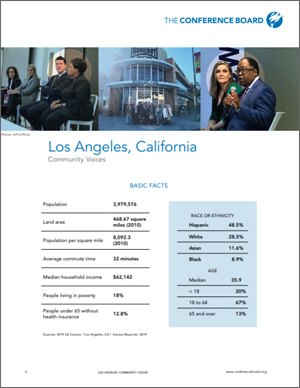Executive Summary
Accounting for 82 percent of the US population and 88 percent of its jobs, cities are at the center of American economic, political, cultural, and community life.[1] At the same time, cities are a locus of long-standing social problems, such as homelessness, poverty, inequality, race-related issues, unaffordable housing, and crime. While The Conference Board has been offering sound recommendations for companies to address social issues for more than 100 years,[2] there is now an opportunity for companies—through their corporate citizenship efforts—to create more lasting positive change in cities and their communities, in areas ranging from economic opportunity and education to health care and racial equality.[3]
It is an opportunity made possible by corporate leaders’ focus on sustainable capitalism; by investors and other stakeholders looking for corporate leadership in addressing social challenges; by innovative approaches to collaborative problem-solving being adopted by corporations, governments, and nonprofits across the US; and by more new sources of data that improve the efficiency and effectiveness of corporate philanthropy.[4] Seizing this opportunity is made all the more urgent by the social crises of 2020.
As discussed in this report, taking advantage of this opportunity requires a progression in the way companies have traditionally approached corporate citizenship and philanthropy. Corporate philanthropy has come a long way from the days when companies simply wrote checks to support causes that matched the interests of the company or its senior management.
Our work has underscored the importance of five key hallmarks of a new era of more effective corporate efforts to improve the quality of life in cities:
- a more in-depth understanding of communities’ needs;
- closer collaboration with a range of community stakeholders to develop and execute joint plans and priorities;
- more intensive use of data to identify the scope of the challenge and improve the effectiveness and efficiency of the response;
- a willingness to commit to multiyear programs, in addition to the traditional annual funding cycles; and
- leveraging a broader suite of corporate resources, beyond those managed by the corporate citizenship and philanthropy functions, to address social challenges.
Insights for What’s Ahead
More open and honest conversations with multiple stakeholders about what companies can provide and what grantees need are essential to companies’ social programs having more enduring positive outcomes in cities. While corporate citizenship departments have been addressing social problems in cities through their philanthropy, community relations, and employee volunteer programs for decades, companies sometimes take an approach that is driven more by internal priorities and programmatic goals than by an in-depth understanding of community needs. At the same time, nonprofit grantees are sometimes reluctant to fully disclose their needs and those of their communities because they are concerned that their candor may deter companies from providing funding.
Overcoming those hurdles to have more open, honest conversations with a wide variety of stakeholders to understand their points of view on how best to address the problems their community is facing is critical. To quote Stephen M.R. Covey: “Change moves at the speed of trust.”[5]
The Conference Board ESG Center’s Corporate Social Responsibility (CSR) Council’s tour of four US cities is an exemplar of this approach. The Council’s tours of Newark, New Jersey; Los Angeles, California; Detroit, Michigan; and Baltimore, Maryland, afforded participants multiple opportunities to hear—firsthand—local corporate, university, nonprofit, government, law enforcement, faith-based, and community leaders’ candid perspectives on social problems their communities are facing and suggestions for how to address them.
Those candid conversations need to be followed by close collaboration between a company and other stakeholders in defining the problem, identifying goals, and developing solutions. The traditional top-down approach can fall short of solving cities’ social problems and have other lasting negative effects. When corporate citizenship efforts do not adequately address community needs, the result can be feelings of disempowerment and distrust as community stakeholders believe there is not much they can do when companies are intent on realizing their own agenda. As succinctly summed up by B. Cole, founder of Dovecote Café in Baltimore, “[S]ometimes I feel like impact has been done to us.”
By contrast, companies can have a much greater impact if they are willing to be led by other stakeholders in addressing the challenges their communities face. Doing so enables companies to tap into communities’ expertise regarding both the nature of social problems—as they are living them—and approaches to addressing them. Willingness to be led, or to share a leadership role, can be challenging. One way to begin is by surveying grantees anonymously about company funding practices to get a candid assessment of how a company could shift its leadership style.[6]
Stakeholders say they are looking for companies to cooperate with the communities they support, engage with city and state lawmakers to initiate policy change, and leverage leaders’ influence and connections to champion change. To collaborate effectively with communities, companies may consider: 1) coming to a common understanding of the problem being addressed; 2) mutually defining the objectives and goals of the collaboration; and 3) together deciding which steps to take to achieve the desired change.[7] In short, working collaboratively to adopt a joint plan with clear goals and assignment of responsibility.
The T. Rowe Price Foundation offers an example of a truly collaborative and effective approach. Part of the organization’s impact grants process since 2015 involves working with its nonprofit partners to create a dashboard of mutual performance indicators and associated goals to which they hold each other accountable for the duration of the grant. According to John Brothers, the President of the Foundation, this collaboration makes it easier to adapt their programs based on lessons learned during their operation, which helps to optimize the efficiency and impact of their work with nonprofit partners.
Rocket Community Fund’s Neighbor to Neighbor program is another example of this approach. It created a network of 30 community groups that hired Detroit residents to contact Detroit homeowners who are chronically behind on their property taxes and, working with the City of Detroit, provide them with funding and other resources to address their situation through the proper channels. To date, its program has produced close to 1,500 new homeowners and kept tens of thousands of families in their homes.
Companies can use new sources of data to define the cost of addressing social problems and measure the efficiency and effectiveness of their efforts, all while strengthening collaboration with other stakeholders. As companies and communities alike are focused on programs that have a measurable and meaningful impact on addressing social problems, they also have new sources of data to improve their decision-making. For example, the Impact Genome Project® (IGP) Sentinel Outcomes Initiative is now quantifying and tracking Americans’ unmet needs in the areas of financial health, social capital, food security, housing, employment, and education. The initiative will measure: determinants of need, the cost of addressing those needs, the gaps in access, and the number of nonprofits serving those needs.[8]
In addition to helping to define the cost of addressing social problems, there are now data sources to help companies better measure the efficiency of their efforts. IGP’s Price of Impact Index provides the “cost per outcome” (CPO) for achieving over 100 different results in areas from arts to economic development, and education to public health. These data, derived from thousands of nonprofits in the US, enable funders to benchmark the cost of their programs, estimate the impact of their programs given a funding amount, assess the efficiency of their programs, and inform budget decisions. Even more importantly, they provide unbiased empirical information for corporations, nonprofits, and government agencies to work together in addressing challenges.[9]
Companies should consider taking a longer-term approach in their financial and other commitments. Council members acknowledge that corporate grants typically last for one year and are for restricted purposes.[10] This can make such grants easier to justify internally: a limited financial commitment, with a clear programmatic goal, and ability to assess impact relatively quickly.
Short-term grants can be useful for, among other things, funding research and establishing a relationship with new grantees. But if companies limit themselves to annual grants, they can also limit their ability to address the causes of large, complex, interconnected social problems. Adopting a long-term perspective, including making multiyear grants, can be better suited to fostering a deep understanding of the problems to be addressed, building a collaborative working relationship, and adjusting solutions based on experience.[11]
One example of this commitment to multiyear funding is JPMorgan Chase’s AdvancingCities program: a $500 million, five-year initiative to help revitalize cities. Since its 2014 inception, in Detroit alone, the program has helped 14,000 residents participate in workforce training programs, created or preserved 2,000 units of affordable housing, created or preserved 3,000 jobs, and given 7,000 small businesses capital or technical assistance.
Companies can reduce risks associated with providing multiyear unrestricted grants by having honest, open, and collaborative discussions with grantees and other stakeholders up front, as well as by beginning with a one-year unrestricted grant that can be extended provided performance goals are met.
Companies can more aggressively use their corporate citizenship functions to leverage the company’s broader business resources to address social issues in ways that also serve the company’s business interests. To be effective, corporate citizenship professionals need to understand both their company’s capabilities and the needs of a variety of communities,[12] and help bring the broader suite of corporate capabilities to bear. A practical first step is for the corporate citizenship department to meet with its internal colleagues to determine ways the business can address the issues communities have identified and establish opportunities for collaboration.[13]
Prudential Financial’s work in Newark provides an example of a company leveraging its corporate citizenship and community knowledge to inform its broader business efforts. Business functions including sales, marketing, human resources, and procurement have called upon corporate citizenship to guide them in: 1) developing products and services for people of color; 2) addressing unconscious bias against people of color in hiring and promotion processes; and 3) developing equitable procurement qualifications and standards.
[1] “Urban Population (% of Total Population) - United States,” The World Bank, 2018; “The Mayors’ 2020 Vision: An American Breakthrough,” The United States Conference of Mayors, 2020; A.J. McMichael, “The Urban Environment and Health in a World of Increasing Globalization: Issues for Developing Countries,” Bulletin of the World Health Organization 78, no. 9 (2000):1117–1126; “More Than 400 Bipartisan Mayors Now Signed on to Letter Calling for Action on Direct Fiscal Assistance for Cities,” The United States Conference of Mayors, January 29, 2021.
[5] Stephen M.R. Covey, The Speed of Trust: The One Thing That Changes Everything (FranklinCovey, 2006).
[8] “The Impact Genome Project® Announces a New Standard for Measuring Social Determinants of Health,” PR Newswire, April 2, 2021.
[9] Parkinson, "Data-Driven Corporate Philanthropy."
[10] Kathleen Kelly Jamus, Social Startup Success: How the Best Nonprofits Launch, Scale Up, and Make a Difference (Boston: Da Capo Lifelong Books, 2018).
[11] Parkinson, "Data-Driven Corporate Philanthropy."














